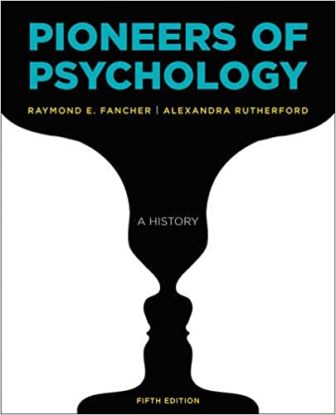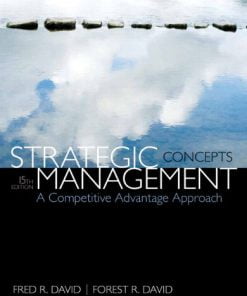Test Bank for Pioneers of Psychology, 5th Edition, Raymond E. Fancher, Alexandra Rutherford,
$55.00 Original price was: $55.00.$29.99Current price is: $29.99.
Test Bank for Pioneers of Psychology, 5th Edition, Raymond E. Fancher, Alexandra Rutherford,
Sell by: Christopher Turner
Category: Test Bank
This is completed downloadable of Test Bank for Pioneers of Psychology, 5th Edition, Raymond E. Fancher, Alexandra Rutherford

Product Details:
- ISBN-10 : 9780393283549
- ISBN-13 : 978-0393283549
- Author: Raymond E. Fancher, Alexandra Rutherford
Pioneers of Psychology tells the stories of the men and women who have shaped our understanding of what it means to be human. The authors illuminate major themes and controversies in psychology’s history through carefully crafted stories of real people, their personal journeys, and their intellectual insights. The Fifth Edition includes three new chapters covering historiography, pre-1600 psychological ideas, and clinical psychology.
Table of Content:
- 1. Foundational Ideas from Antiquity
- The Greek Miracle and the Presocratic Philosophers
- The Concept of Psyche
- Pythagorean Mathematics and Philosophical Paradoxes
- The Hippocratics
- The Life and Thought of Socrates
- Plato’s Life and Philosophy
- Platonic Idealism
- The Platonic Legacy
- Aristotle and Empiricism
- Biological Taxonomy
- On the Psyche
- An Atomic Footnote: Democritus, Epicurus, and Lucretius
- Three Islamic Pioneers
- Al-Kindi and the Introduction of Indo-Arabic Numerals
- Alhazen and Modern Visual Science
- Avicenna on Medicine and the Aristotelian Soul
- Europe’s Intellectual Reawakening
- Suggested Resources
- 2. Pioneering Philosophers of Mind: Descartes, Locke, and Leibniz
- René Descartes and the Mind-Body Distinction
- Descartes’s Method and “Simple Natures”
- Descartes’s Physics
- Mechanistic Physiology
- Rational Qualities of the Mind
- Interactive Dualism
- The Legacy of Descartes
- John Locke and the Empiricist Tradition
- Revolution and Tolerance
- Political Involvements
- An Essay Concerning Human Understanding
- Kinds of Knowledge
- Practical Implications of Locke’s Philosophy
- Gottfried Leibniz and Continental Nativism
- Mathematical Discoveries in Paris
- Serving the House of Hanover
- Monadology
- A Nativistic Critique of Locke
- Lockean vs. Leibnizean Traditions
- Suggested Resources
- 3. Physiologists of Mind: Brain Scientists from Gall to Penfield
- Franz Josef Gall: Brain Anatomist and Phrenologist
- Pierre Flourens and the Discrediting of Phrenology
- Localization Theory Revived: The Brain’s Language Areas
- Paul Broca and the Case of “Tan”
- Sensory and Motor Areas
- Wernicke’s Theory of Aphasia
- Memory and the Equipotentiality Debate
- Stimulation of the Conscious Human Brain
- Wilder Penfield and the Treatment of Epilepsy
- Brenda Milner and the Multiplicity of Memory Systems
- Cartesian Dualism Revisited
- Recent Developments: Cognitive Neuroscience and Social Neuroscience
- Suggested Resources
- 4. The Sensing and Perceiving Mind: From Kant Through the Gestalt Psychologists
- The Kantian Background
- Helmholtz and Psychology’s Physiological Foundations
- The Triumph of Physiological Mechanism
- Helmholtz on Human Vision
- Physical Properties of the Eye
- The Neurophysiology of Color Vision
- Visual Perception
- Helmholtz’s Legacy
- Fechner and Psychophysics
- Fechner’s Early Life
- The Invention of Psychophysics
- Gestalt Psychology
- The Implications and Spread of Gestalt Psychology
- Suggested Resources
- 5. Wundt and the Establishment of Experimental Psychology
- Wundt’s Early Life
- Development as a Researcher
- Experimental Psychology and Völkerpsychologie
- Principles of Physiological Psychology
- Wundt at Leipzig
- Experimental Studies
- Voluntaristic Psychology
- Völkerpsychologie and Its Implications
- Titchener’s Structuralism
- Female Students and the Experimentalists
- Experimenting on Higher Functions
- Külpe and the Introspection of Complex Mental Processes
- Ebbinghaus’s Studies of Memory
- Wundt’s Reputation and Legacy
- Suggested Resources
- 6. The Evolving Mind: Darwin and His Psychological Legacy
- Darwin’s Early Life
- The Voyage of the Beagle
- Geological Discoveries
- Biological Discoveries
- The Return Home
- The Theory of Evolution by Natural Selection
- The Origin of Species
- Darwin and Psychology
- The Descent of Man
- Race and Gender
- The Expression of the Emotions
- “A Biographical Sketch of an Infant”
- Darwin’s Impact on Psychology and Society
- Social Darwinism
- Comparative Psychology and Individual Differences
- Recent Developments: Emotions, Sociobiology, and Evolutionary Psychology
- Suggested Resources
- 7. Measuring the Mind: Galton and Individual Differences
- The Anthropometric Laboratory
- Galton’s Early Life and Career
- Darwinian Theory and Hereditary Genius
- The Normal Distribution
- Pedigrees of Eminence
- Adoptive vs. Biological Relatives
- Nature and Nurture
- Eugenics
- The Idea of Intelligence Testing
- Statistical Correlation and Regression
- Other Contributions
- Galton’s Influence and Continuing Controversies
- Twin Studies and the Heritability of Intelligence
- The Burt and Jensen Affairs
- The Minnesota Study of Twins Reared Apart
- Suggested Resources
- 8 American Pioneers: James, Hall, Calkins, and Thorndike
- James’s Early Life
- James the Teacher
- The Principles of Psychology
- The Stream of Consciousness
- Habit
- Emotion
- Will
- James’s Later Career
- The Philosophy of Pragmatism
- The Varieties of Religious Experience
- A Continuing Influence
- Hall: Institution Building and Child Studies
- Institutional Innovations
- Child Study and Developmental Theory
- An Unlikely Legacy
- Calkins: Associative Learning and Self-Psychology
- Graduate Education: Challenges and Accomplishments
- Psychology at a Women’s College
- Heidbreder and Seven Psychologies
- Thorndike: Intelligence, Learning, and Education
- A Puzzle Box Ph.D.
- Functionalism
- Suggested Resources
- 9. Psychology as the Science of Behavior: Pavlov, Watson, and Skinner
- Pavlov’s Early Life and Career
- Pavlov’s Laboratory
- The Physiology of Digestion
- Conditioned Reflexes
- Generalization, Differentiation, and Experimental Neuroses
- Pavlov’s Theory of the Brain
- Pavlov’s Influence
- Watson’s Early Life and Career
- The Founding of Behaviorism
- Watson’s Behavioristic Writings
- Conditioned Emotional Reactions
- Advertising and Behaviorism
- From Little Albert to Little Peter
- Psychological Care of Infant and Child
- Watson’s Legacy
- Skinner’s Early Life and Career
- Operant Conditioning
- Behavior Shaping and Programmed Instruction
- Philosophical Implications of Operant Conditioning
- Skinner’s Influence
- Suggested Resources
- 10. Social Influence and Social Psychology: From Mesmer to Milgram and Beyond
- Mesmer and Animal Magnetism
- Claims and Controversies
- From Mesmerism to Hypnotism
- Puységur’s Artificial Somnambulism and Faria’s Lucid Sleep
- Mesmeric Anesthesia to Hypnotism
- The Nancy-Salpêtrière Controversy
- The Salpêtrière School
- The Triumph of the Nancy School
- The Psychology of Crowds
- Binet’s Experiments on Suggestion
- The New Discipline of Social Psychology
- Asch and Social Conformity
- Festinger and Cognitive Dissonance
- Milgram and the Obedience Studies
- Ethical Concerns and Consequences
- Social Influence Today
- Loftus and the “Lost in the Mall” Technique
- Suggested Resources
- 11. Mind in Conflict: Freudian Psychoanalysis and Its Successors
- The Origins of Psychoanalysis
- Freud’s Early Life
- Free Association
- The Interpretation of Dreams
- Wish Fulfillment and the Seduction Theory
- Self-Analysis and Childhood Sexuality
- Psychoanalytic Therapy and the Case of Dora
- Later Psychoanalytic Theory
- Metapsychology and the Defense Mechanisms
- Male and Female Superegos
- Disciples and Dissidents
- Adler and Individual Psychology
- Jung and Analytical Psychology
- Freud and Academic Psychology
- Suggested Resources
- 12. Psychology Gets “Personality”: Allport, Maslow, and the Broadening Field
- Allport and Personality Psychology
- The Emergence of “Personality”
- Creating a Discipline
- Personality: A Psychological Interpretation
- Personality Psychology Comes of Age
- Nomothetic Studies: The Analysis of Traits
- Idiographic Approaches: Personology and Psychobiography
- Allport’s Later Career
- Religion and Prejudice
- Prominent Students
- Maslow and Humanistic Psychology
- A Paradoxical Early Life
- Wisconsin Psychology and the Social Behavior of Monkeys
- New York as the “New Athens”
- An Anthropological Mentor: Benedict
- Neo-Freudian Mentors: Adler, Horney, and Fromm
- Gestalt Mentors: Wertheimer and Goldstein
- Maslow’s Theory of Human Motivation
- Self-Actualization
- The Hierarchy of Needs
- A Positive Approach to Psychology
- Establishing a Humanistic Psychology
- Humanistic Allies: Rogers, May, and Allport
- Maslow’s Late Writings and the Legacy of Positive Psychology
- Suggested Resources
- 13. The Developing Mind: Binet, Piaget, and the Study of Intelligence
- Binet’s Early Life and Career
- Individual Psychology
- The Binet Intelligence Tests
- The 1905 Tests
- The 1908 and 1911 Revisions
- The Rise of Intelligence Testing
- General Intelligence and Intelligence Quotients
- Feeblemindedness and Giftedness
- Deviation IQs and the Flynn Effect
- Piaget’s Early Life and Career
- Genetic Epistemology and the Stages of Development
- Sensory-Motor and Preoperational Intelligence
- Concrete and Formal Operations
- Piagetian Influences and Reactions
- Suggested Resources
- 14. Minds, Machines, and Cognitive Psychology
- Pascal, Leibniz, and the Origins of Artificial Intelligence
- Babbage, Lovelace, and the Analytical Engine
- Turing’s Machine and Shannon’s Binary Switches
- Intelligent Machines and Information Theory
- Logic Theorist and General Problem Solver
- TOTE Units
- Computer Triumphs and Limitations
- Improbabalist and Impossibilist Creativity
- Strong and Weak Artificial Intelligence
- Miller and the Study of Cognition
- Chomsky and Psycholinguistics
- Bruner and the Harvard Center for Cognitive Studies
- A Cognitive “Revolution”?
- Neisser and Cognitive Psychology
- Machine Intelligence vs. Human Intelligence
- A New Academic Subdiscipline
- Suggested Resources
- 15. Applying Psychology: From the Witness Stand to the Workplace
- Münsterberg and Psychology in the Courtroom
- Münsterberg’s Early Life
- Abandoning the Laboratory
- Psychology in Business and Industry
- Taylor and Scientific Management
- Finding the Right Worker for the Job
- Scott and the Psychology of Advertising
- Marston and Popular Psychology
- Gilbreth and the Psychology of Management
- California Origins
- Efficiency and the Worker
- Spreading the “One Best Way”
- Managing the Home and Nation
- Mayo and the Hawthorne Studies: Origins of the Human Relations Movement
- Australian Origins
- The Changing Workplace
- What Happened at Hawthorne
- Interpretations and Legacy
- Hollingworth: Clinician, Feminist, Professionalizer
- Early Years
- Becoming a Psychologist
- Pioneering the Psychology of Women
- Professionalizer of Clinical Psychology
- From Margin to Center: Application Takes Hold
- Suggested Resources
- 16. The Art and Science of Clinical Psychology
- Harrower’s Journey
- From Experimentalist to Clinician
- Rorschach Encounters
- Researching the Rorschach
- Becoming “Properly Clinical”
- Shakow and the Scientist-Practitioner Model
- Training and Credentialing
- Critics of the Model: Albee and Eysenck
- Making Psychotherapy Scientific
- Rogers and Client-Centered Therapy
- Psychotherapy Research
- Beck and the Development of Cognitive Therapy
- Breaking Away from Psychoanalysis
- The Cognitive Theory of Depression
- Making Cognitive Therapy Scientific
- Psychotherapy Research Revisited: Treating Depression
- Hathaway and the MMPI
- From Inkblots to Profile Plots
- Contemporary Issues and Debates
- Suggested Resources
- Notes
- Glossary
- Credits
- Index
People Also Search:
pioneers of psychology 5th edition
pioneers of psychology 5th edition raymond alexandra
pioneers of psychology 5th edition raymond alexandra download scribd
pioneers of psychology 5th edition raymond alexandra test bank download pdf
Related products
Sale!
Sell by: Chloe Roberts
Sale!
Sell by: Ellie Graham
Sale!
Sell by: Jared Welch
Sale!
Sell by: Matthew Clark
Sale!
Sell by: Cody Harper
Sale!
Test Bank
Test Bank for Clinical Immunology and Serology A Laboratory Perspective, 3rd Edition: Stevens
Sell by: Joseph Carter
Sale!
Sell by: Lucy Torres
Sale!
Sell by: Michael Johnson











